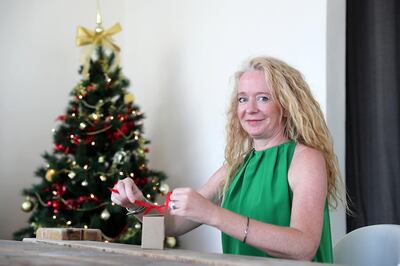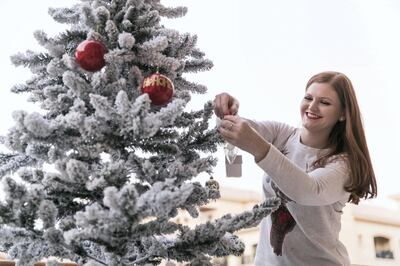For some, Christmas means splashing out with no expense spared, while others prefer a simple homemade gift or a gesture of love.
Unhampered by Brexit doom-mongering, British families are expected to spend an average of £821.25 (US$1,095) on gifts, food and drink and decorations, which is up 1.3 per cent on last year, and driven by online spending. That's 54 per cent more than the European average of £532 (Dh2,611), according to figures from VoucherCodes and the Centre for Retail Research (CRR). It's also more than the Americans, who are predicted to fork out US$906 on Christmas gifts this year, according to statista.com.
Here, five UAE residents reveal how they prefer to spend their money over the festive period:
The budgeter
Heidi-Jane Hill, 46, from the United Kingdom, works part time as a school administrator in Dubai. She is also on the organising team for he UAE Bogleheads Chapter, a non-profit community of personal finance and investing enthusiasts. Ms Hill's head for finance makes her a thoughtful spender; she prefers to give personalised cards and keepsakes to loved ones at Christmas. She lives in Al Barsha with her husband and three dogs.
"The bottom line is making time. I start thinking about Christmas early in the year, so if a relative is coming out to see me from the UK, they can bring the gifts out with them. I have a spreadsheet to track who I give gifts to and how much I spend, mainly to ensure I don’t buy the same gift twice for the same person. I recommend having a conversation with family and friends to limit the budget for gifts. That way you can set it and stick to it. If someone buys you gift vouchers, use it to buy gifts for others.

I tend to have a theme each year for gifts and send the same type of gift to all. One year, I made personalised calendars for everyone. The gift is then small and cheap, but shows a lot of thought. In the UAE, I've started to look at boutique-style gifts, which I think shows effort and thought over cost. I like things that are beautifully packaged and unique. The site littlemajlis.com is great. I've bought personalised doodles for friends, and silver bracelets with a personal message - special latitude/longitude co-ordinates in my case.
I use the website moonpig.com to make personalised Christmas cards to send to friends and relatives back home. I think receiving something that time and effort has been put into by me uploading photos to go onto the card touches the recipients, and often this is enough for them - they don't expect gifts also. Moonpig also have great offers, so when you send five cards in one purchase, you get 50 per cent off the total. In the UAE, you can buy personalised gifts and cards from dinodrops.com."

The splurger
Natalie Christodoulides, from the UK was raised in Abu Dhabi. She is an office manager and also an administrator for the food experiences community Best Bites Abu Dhabi. Ms Christodoulides, 24, likes to splash out at Christmas time.
"Christmas is an expensive time of year here in Abu Dhabi. I spent a few years in the UK for my university education and always came home to my family, who live in Abu Dhabi, for Christmas, so I was able to pick up fun little gifts for much cheaper back home and bring them back with me.
Even with things such as perfume and clothes you tend to get a better deal when buying back in the UK. Usually, I buy individual presents for my close friends and family, but I also try to give a little something to colleagues, even if it's just something small such as a box of biscuits and a card.
On presents alone, I usually spend around Dh6,000. I try to set a budget for those I'm buying presents for, to make sure it's relatively equal. This year is the first decorating my own home, so setting a budget for that has been difficult as I've had to buy everything, from a Christmas trees and baubles to house decorations. It’s cost me around Dh3,500 to Dh4,000."
_______
Read more:
Plan, give and spend smart to avoid holiday debt
Planning for your children’s future: the gift of financial security
_______
The time giver
For the last 20 years, Rain Hampton, her husband and three children have followed a tradition of giving the gift of time, rather than buying each other material presents. Ms Hampton, a former interior designer from California, lives with her husband in Abu Dhabi
"When our children were young we probably used to spend $US100 to $200 for each kid in toys. When they outgrew toys, we took that money and instead spent it on doing something together.
As our children started to give each other gifts, they rarely had money and were too practical to buy junk, so they also started to give each other the gift of time. Every year, they got more and more creative, and now they all look forward to spending that time together - from going out for coffee, to making a gourmet meal.
My daughter would regularly plan a day that she and both her brothers went to a movie that perhaps was a remake from their childhood. We parents have bought everyone a trip snowboarding, museum tickets, a movie on opening night and family weekenders."
The top-toy buyer
Last Christmas, grandmother Diane Nobles-Eldakak, the operations manager for Little Smarties nursery in Khalifa City A, paid over the odds to make her four grandchildren happy. The American stumped up US$1,200 on four of that season’s must-have children’s toy, Hatchimals. The furry interactive robot toys, so called because they hatch from eggs, were so much in demand that stocks ran very low, and the initial US$60 price tag was quickly surpassed by those selling them on auction sites.
"Since our family is growing, I only buy (presents) for my grandchildren, as I give my own four grown children money when they need it for expenses throughout the year.
Hatchimals were the gift to have in 2016. I got into bidding wars on eBay because it seemed that every store was out of them. So a simple toy that had a fixed price then became a hugely expensive investment as a Christmas toy, and I needed four of them to cover gifts for all four granddaughters. I wound up spending $300 for each of the four Hatchimals I bought.
The high price I paid shows how businesses prey on the heartstrings of parents and grandparents, who will do anything and spend anything to make sure their kids and grandkids are happy.
I suggest to other grandparents to buy Christmas toys in July when they are at their cheapest, because when it gets close to Christmas, there is no capped limit on how much the price that Christmas toys will reach - especially when you are living overseas, and you are desperate to make your granddaughters' Christmas special for them."
The homemade giver
Jean Lewis is Mexican-Canadian but Malaysian-born and loves to spend her Christmas cooking up her family’s traditional festive meals. Ms Lewis has been an expat for 28 years, living in Singapore, Mexico, Japan and Canada before settling in Abu Dhabi.
"Christmas has become so commercial, people forget what it's really about - not presents and expensive parties, but family and friends. My children come to Abu Dhabi to spend Christmas with us, and long for homemade goodies.
We have Christmas Eve dinner at home, and Christmas day means all the yummy leftovers. We take in anyone that's alone for Christmas, and we won't turn away unexpected guests. We try to include those alone for the holidays, so they don't feel sad or left out if they had to stay behind to work - the more the merrier. Sometimes we have up to 12 people. Gifts are optional, and if friends attend (as well as family), they’re secret Santa style, spending a maximum of US$20 on each.
Christmas dinner is ‘Bacalao a la Vizcaina’, a traditional Christmas dish in Mexico which is a stew made using salted cod. We usually get the salted cod from Mexico when we go home.
We also eat Romeritos, a traditional Mexican dish made using a special type of sauce with shrimp croquettes and potatoes. We bring the sauce from Mexico and source other ingredients in local markets here.
Finding ingredients can get expensive, especially the turkey, but homemade means a lot to my family. Up to a month before, I look for sales on ingredients like olives and good olive oil. I always buy local where possible, especially fresh produce."
_____
Read more:
How to budget for a surprise expense in the UAE
20 tips to get your finances back on track in the UAE
______
The charitable giver
Cindy Washburn, a homemaker from South Carolina in the US, who lives in Abu Dhabi, is a mum of three and a grandmother too. Christmas for her is about homemade gifts and giving to those in need.
"Ever since my daughters were small, they have always received colouring book and crayons. Now as adults they still get those. My first Christmas as an expat, my son-in-law knew how important this tradition was to my daughter; so, he made sure both my daughter (his wife) and her sister had those “Santa” gifts. That thoughtfulness on his part was special for them as well as me.
After opening gifts, some of which are handmade scarves, dresses, and pants, we go to breakfast and then an afternoon movie, as well as visiting family and exchanging small gifts.
We also encourage our children to find a family in need to help. I have baked goodies and had them help distribute to doctors’ offices, co-workers of mine and my husband, and neighbours. We have attempted to teach our children that the spirit of Christmas is the act of unselfish giving rather than receiving."






